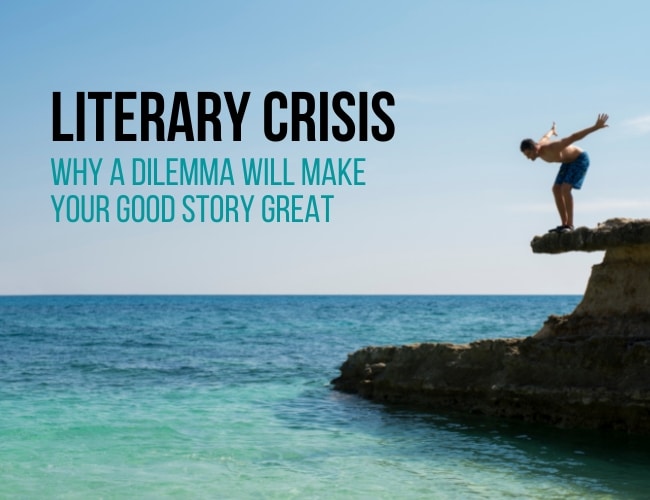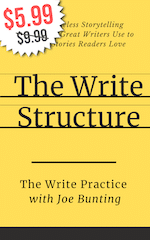You've turned to literature in times of crisis and dilemma, but have you considered how important a literary crisis or dilemma is in literature?
After you finish writing a book, you should be proud. You're probably excited. Visions of publishing dance in your head. But then you go back and read your story or novel or book, and you think, “Well, this is good and I feel proud of it. But it doesn't match up to the stories/novels/books I know and love.”
You wrote a GOOD story, but not a GREAT one. Worse, you don't know why. In this post, I'll explain exactly what to look for to make your good story great.

Note: this article contains an excerpt from my book The Write Structure, which is about the hidden structures behind bestselling and award-winning stories. If you want to learn more about how to write a great story, you can get the book for a limited time low price. Click here to get The Write Structure ($5.99).
How I Wrote a GOOD but not GREAT Book
A couple of years ago, I finished the memoir I had been working on for over two years. After I finished, I read it, and while I thought it was OK in some parts and really good in others, there was something missing. It was GOOD but definitely not GREAT.
And I had no idea why my book wasn't working. I spent a month trying to figure it out. That month turned into two, which turned into four. I still hadn't figured out what was wrong.
Honestly, there were moments when I thought I would never figure it out. I worried the book would never be published, that the years of work would be wasted. I thought about all the readers waiting for the book, how flaky I would look when I told them that I had decided not to publish it because it wasn't any good. I was sinking into depression over it.
My author friends couldn't understand why I didn't just publish it. “You'll write another book that will be better. Just publish this and get started with your next one.” It was good advice. I knew that if I were in their shoes, I would say something similar. But even as I didn't know how to fix the book, I couldn't let it go either.
The Secret to Great Books
I had a breakthrough when I went to the Story Grid workshop in New York City led by Shawn Coyne. He's Steven Pressfield's editor, the author of The Story Grid, and the creator of the Story Grid podcast.
I went to the workshop skeptically—attending mostly because my friend Tim Grahl was helping to run it. I had read the book before and listened to a few podcast episodes, but I honestly wasn't expecting to be radically transformed by the workshop. I've been studying writing and storytelling for over a decade. I thought I might get a few good tips, but I didn't believe Coyne or anyone else would have that much to teach me that I hadn't heard before.
I was wrong. The workshop completely changed my writing and editing process. Since then, the Story Grid has become a constant when framing the structure of my story.
I also finally knew why my good book wasn't great. I finally understood why my story wasn't working.
My story lacked a dilemma, what Coyne calls a crisis
Definition: What is a Literary Crisis or a Dilemma?
A literary or story crisis, also called a dilemma, is the crucial moment (or moments) when a character is confronted with a significant choice that will change the trajectory of their life.
I find that people get confused with the term “crisis,” though, so in The Write Structure framework we call this element the dilemma.
You may have heard that in a good story your protagonist must make a decision. I knew this, but what I was lacking was how to set up that decision. The dilemma is the moment where your protagonist is placed into such a tight spot that he or she has to choose, and importantly, that decision carries so much weight that there is no turning back from it.
This choice represents how a character is forced between opposing forces, internal or external, and the only way to move forward is by making a difficult decision.
In other words, a dilemma is drama.
Why a Dilemma Is the Foundation to Your Story
Have you ever read a book and found yourself thinking, “There's no possible way this character can get out of this situation! This is just too bad. They're in way over their head, and there is no getting out of it.”
THAT is a literary dilemma. And readers love this moment. Why? Because we want to know what happens next!
A dilemma sets up a knowledge gap, and readers become desperate to fill that gap. It's in moments like this that readers are tempted to skip to the last page in the book just to find out if everything turns out OK (not that I've ever done that, of course).
Where Dilemmas Happen in Your Story
Every scene must have a crisis. Every act must have a crisis. And every book must have a crisis.
Crises are the foundation of your story.
Crises are questions, they're dilemmas, and since they're internal conflicts happening in a character's head, they usually occur “off screen.” In other words, they're implied but not specified. BUT you the writer still need to know what the literary crisis is in every story you write.
Where does the dilemma occur? The dilemma occurs directly in the middle of your story, specifically following the last complication that occurs in the Rising Action, or an action or revelation that forces the character, probably the point of view character, into a crisis decision. In The Write Structure framework, it looks like this.
- Exposition. Life as normal.
- Inciting incident. There's a problem.
- Rising Action or Progressive Complications. The character attempts and fails to deal with the problem.
- Dilemma. The character must make a difficult choice to deal with the problem.
- Climax. The character makes his or her choice and the climax is the action that follows.
- Denouement. The problem is resolved (for now at least) and a new normal is established.
A good example of this is the film Gravity (which is amazing, if you haven't seen it). Sandra Bullock's character's problem is that everything is trying to kill her. The progressive complications get worse and worse until *spoiler alert* everyone is dead except for her.
This is where many writers would stop. They would show her struggle to survive and resolve it by eventually getting to a place where she does, in fact, survive.
But what makes this story GREAT rather than good is that her character reaches a dilemma. Finally, it becomes clear that she is definitely going to die. She is faced with a best bad choice situation: take her life into her own hands and end her own life OR keep fighting to survive even though she will suffer and almost certainly die anyway. (If you've seen the film, this is that moment when George Clooney reappears.)
This dilemma is so important because it gives the character the chance to make a choice. Fighting for survival isn't a choice. Who wouldn't fight to survive? But when it becomes easier to stop fighting than it is to just die, then it leads to the crisis.
The Two Types of Dilemmas
In The Story Grid, Coyne says crises are always a choice that your protagonist faces, and they come in two easy-to-follow formulas:
- Best Bad Choice. The best bad choice crisis is easy to understand. Just think of that game “would you rather.” You're given a choice between two horrible things. Which do you choose? For example, would you rather leave the love of your life at a party with another guy, or let her humiliate you as she flirts with him? See? Drama, right?
- Irreconcilable Goods. There is another, somewhat less stressful way to create a crisis. Irreconcilable goods are two values that don't work together. For example, love vs. money. Both are good, but like oil and water, they don't mix. Another example: you get into your dream college, but if you go you have to leave your high school love. Other examples: comfort vs. adventure, personal happiness vs. the happiness of others, and success vs. family.
You can recognize these situations in your own life, right? We've all been through these crisis moments, and the choices we make in the midst of them carry outsized consequences when compared to most of the little decisions we make in our lives.
In my own writing, I use these two formulas to write great scenes, but also to audit scenes, stories, and even whole books I've already written to make sure I'm setting up a big enough story crisis.
For example, in the memoir I wrote, I realized it wasn't working because I didn't have any clear dilemmas. Things just happen. I didn't set up clear literary crises, and therefore the choices my character was making didn't matter. Since the book is a memoir, I couldn't manufacture story crises, and so I had to pull them out of my actual experience.
One that I discovered in the first act of my story was a Best Bad Choice dilemma. In Paris, I wanted to live the “writer's life,” where I hung out in cafés, drank coffee and wine, soaked up the atmosphere, people-watched, and wrote my book. But when my readers gave thousands of dollars to make me take on crowdsourced adventures, I had to choose between either refunding them money and being embarrassed or giving up my comfortable, “writerly” trip for an uncomfortable (but maybe more interesting) one.
I was able to take a dilemma that I was experiencing privately and turn it into a literary crisis that centered my story.
Want to see a crisis in action? Watch this. (My favorite is the woman at 7:06.)
Make Your Story Great with a Literary Crisis
Is your story risky enough? Is your protagonist making life and death decisions? Is he or she making decisions at all?
How can you heighten the risk of those decisions? How can you put him or her into a best bad choice or irreconcilable goods crisis?
If your character is just going along with everything, your story might be good, but it will never be great.
 Need more plot help? After you practice this plot element in the exercise below, check out my new book The Write Structure which helps writers make their plot better and write books readers love. Low price for a limited time!
Need more plot help? After you practice this plot element in the exercise below, check out my new book The Write Structure which helps writers make their plot better and write books readers love. Low price for a limited time!
Have you ever faced a best bad choice or irreconcilable goods crisis? Tell us about it in the comments.
PRACTICE
- Does it have a crisis?
- Is it a best bad choice or irreconcilable goods crisis?
Write out the story crisis using one of the two crisis formulas (i.e. best bad choice or irreconcilable goods).
If you are already a Write Practice Pro member, post your practice here in the Practice Workshop for feedback. Be sure to give feedback to a few other writers and encourage each other.
Not a Pro member yet? You can join us here as a Write Practice Pro monthly subscriber and see what a difference a professional writing community can make as you pursue your writing goals!
Happy writing!
Joe Bunting is an author and the leader of The Write Practice community. He is also the author of the new book Crowdsourcing Paris, a real life adventure story set in France. It was a #1 New Release on Amazon. Follow him on Instagram (@jhbunting).
Want best-seller coaching? Book Joe here.


This is the EXACT problem with my novel’s first chapter. In my author’s mind, I thought there was a crisis. But when I picked it up one year later, hardly anything resembling real crisis exists. Yikes! Thanks for the coaching, Joe. I’m bookmarking this one and referring back when I’m ready to give that opening chapter a rewrite!
Awesome! I had the same realization about half my book when I first learned this stuff (and I still have this realization but hopefully now it comes a little faster!).
Thanks, Joe. What’s a story without protagonists agonizing over the right thing to do? I want to make a suggestion, however — from my own observations of myself and others in the worst kinds of crises — namely that when “all is lost”, our faith in our own ability to think is also lost. All is not lost if we still trust our own self-interested mind. So, in the deepest crises we abandon even ourselves, the upshot of which is that we finally and truly SEE. So, it’s not a decision, it’s “seeing.” There is no choice involved. Therefore, I see all true crises as a kind of religious experience, and I doubt that anything short of that is going to give the reader their money’s worth. The woman on the ten metre board — she stops retreating because… she SEES herself for what she is and what she can be. At least, that’s the way I see it. What say ye?
I agree with you. There’s a liminal space that is able to be opened up in the midst of a crisis that we/our characters don’t have access to outside of the crisis. Great observation PJ!
Joe…AWESOME video…it pretty much demonstrates how I feel each time I hit the “submit” button for contest pieces to judges! I also noticed something a bit interesting–it appears it’s much more difficult to climb back down all of those stairs than it is to just JUMP! Thanks for sharing.
I also like a good crisis and always want to know what happens… Come to think of it, I’ve never read a book without skipping to the end first. That’s just the way I am. I don’t like surprises. I have to know if anyone is going to die or if everything is going to turn out okay. That way, I won’t be surprised. I still enjoy the book though so it’s never a problem.
I had almost finished my “crisis” comment when I pressed a key and it all disapeared. That’s my current writing crisis as I can’t face writing it all again. Sorry!!
That’s a perfect example of a crisis! Evelyn 😉 :'( you are the character fighting the evil demon computer.
Thenks B. It may be the evil demon, but I will tame it and continue with my writing.
;-D Yay!
I need to read this article about 3 x or more. I felt like it was me talking when you talked about how to fix your story. This is probably the key I’m looking for. Thanks
Thanks! The video actually helped too, it turns out I got stuck because I didn’t know how to show her having to make the damn choice during the dilemma crisis. and thinking about hat you’ve said in here too of course. Onward with this exciting flash back! (story within a story kind)
Great article and so glad I found it. I’m VERY stuck at the moment and I think is will help me figure it out!